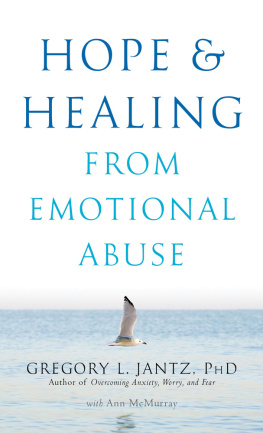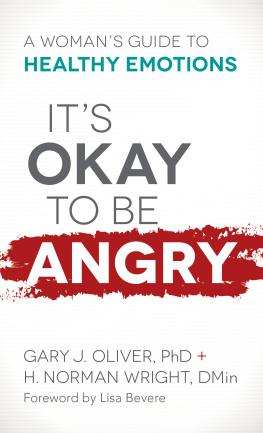Every Womans
Guide to
Managing
Your Anger
Every Womans
Guide to
Managing
Your Anger
Gregory L. Jantz, PhD
with Ann McMurray

2009 by Gregory L. Jantz
Published by Revell
a division of Baker Publishing Group
P.O. Box 6287, Grand Rapids, MI 49516-6287
www.revellbooks.com
Printed in the United States of America
All rights reserved. No part of this publication may be reproduced, stored in a retrieval system, or transmitted in any form or by any meansfor example, electronic, photocopy, recordingwithout the prior written permission of the publisher. The only exception is brief quotations in printed reviews.
Library of Congress Cataloging-in-Publication Data
Jantz, Gregory L.
Every womans guide to managing your anger / Gregory L. Jantz ; with Ann McMurray.
p. cm.
Includes bibliographical references.
ISBN 978-0-8007-3314-8 (pbk.)
1. AngerReligious aspectsChristianity. 2. WomenPsychology. 3.
WomenReligious life. I. McMurray, Ann. II. Title.
BV4627.A5J36 2009
241 .3dc22 2009028313
Scripture is taken from the HOLY BIBLE, NEW INTERNATIONAL VERSION. NIV.
Copyright 1973, 1978, 1984 by International Bible Society. Used by permission
of Zondervan. All rights reserved.
09 10 11 12 13 14 15 7 6 5 4 3 2 1

Contents
Part 1
The Root of Anger
Part 2
The Branches of Anger
Part 3
Uprooting the Anger and Pruning the Branches
It seems like every day I have another reason to thank God for the blessing that is my wife, LaFon. I cannot imagine my life without her and I cannot imagine writing this book without her. She is my sounding board, my partner, truly my better half in so many areas of my life. She puts up with memore, she loves me.
I would also like to thank the many women over the years who have invited me along on their journey to recovery. I may have pointed out an obstacle or two along the way or suggested a different avenue to explore, but the journey has always been theirs. Ive been able to witness and experience the miraculous along the way.
Dr. Gregory L. Jantz
Edmonds, Washington
Ever felt completely misunderstood? Taken for granted? Stressed out taking care of everyone else while nobody pays attention to your needs?
Ever felt out of sorts, out of shape, and out of options?
Ever felt as though you would just lose it if you were presented with one more thoughtless word, one more careless deed, one more unfeeling demand on your time?
Ever felt really, really angry?
Ever felt guilty about it?
Ever wonder why women get so upset? Why is it that women rage and rant, nag and pester, cry and issue draconian ultimatums? Ever wonder why an argument with a woman and an argument with a man can look totally different, even if the subject matter is the same? Ever wonder, What is she so mad about? Ever wonder, What am I so mad about?
It is said that hell hath no fury like a woman scorned, but women can be angry about many things besides just failed relationships. Barraged by cultural standards, life demands, physical realities, and spiritual expectations, todays woman feels light-years away from the contented, put-together woman she wants to be. And shes not too happy about it.
Take Janice, for example. She works in a large office as a middle manager. The company recently downsized, and Janice now spends part of her time doing the sort of secretarial work she thought she left behind eight years ago. Theres simply more work to do than she can get done in a day, in a week, in a month. The constant pressure is overwhelming. Inside, Janice is seething, especially every time shes given a new project that must be done immediately, right on top of the other two she got last week. On the outside, however, Janice never lets on how she feels. She learned growing up that it wasnt polite to show anger. So, at work, Janice is polite. And, in the car on the way home, she carries on imaginary shouting matches with co-workers, her supervisor, and anyone else who got in her way that day. She arrives home feeling exhausted, frustrated, and trapped. Janice doesnt want to take her anger out on her family, but she often does. Now shes feeling guilty on top of being angry. She thinks to herself, How can I stop being angry all the time?
(Janice is just the first of many women youll meet in this book, based on real women Ive met and worked with over the years. The names have been changed and the circumstances altered, in order to ensure a level of confidentiality and privacy.)
Or, take Amy. Shes a mother of three young children, ranging from four to nine and a half. Divorced for about a year, shes struggling with feelings of rage at her ex-husband, Paul. It feels like he came out ahead on the deal, with the kids on Wednesdays and every other weekend. Amy still has primary responsibility for the kids, both through the parenting plan and because Paul cant seem to be bothered with things like medical visits, running their errands, helping with their homework, or making sure they do their chores. Its playtime when he has the kids, and if theres any sort of conflict with his schedule, he calls and cancels. Paul always has some sort of explanation, but its impossible for Amy to listen without ending up yelling over the phone. She promised herself she wouldnt get mad at him in front of the kids, but that promise has been broken so many times, she doesnt bother keeping count anymore. Every time the kids either get ready to go to their dads or come back, her anger spills out on them. Amy knows theyre not responsible, but she has so much anger inside it just keeps sloshing over onto them. She thinks to herself, How can Istop being angry all the time?
Then theres Marilyn. Her kids are grown, and shes financially secure with established friends and activities. All of the outward pieces of her life appear to be in place; she should be content, but shes not. If she goes out to eat, she complains about the food. If she goes to a store, the service is too slow. Its impossible to watch a movie with Marilyn because of her constant critique. Her friends have stopped sharing any passing annoyances about their day for fear theyll end up being lectured for fifteen minutes on what they did wrong and exactly what they need to do in the future to fix it. With Marilyn, there is no such thing as casual conversation. Nothing is too small to escape the reach of Marilyns outrage. Her husband now watches the History Channel in the evening so he doesnt have to listen to her running commentary on the nightly news. Either that or he hides away in the den with ESPN. Marilyn sees nothing wrong with her attitude. Shes not critical, shes discerning. Shes not angry, shes assertive. Shes not frustrated, shes problem-solving. Shes not negative, shes realistic. Shes also not very pleasant to be around. Her family thinks, How can we gether to stop being so angry all the time?
How, indeed? Women juggle the bowling balls of family and finances, children and schedules, church and community, work inside and outside the home. Within this time-pressured vise, self-care and personal reflection get squeezed out. Over time, service begins to feel like martyrdom. Over time, each new responsibility, each additional task can feed the flame of anger and resentment.
The injuries and pain of the past weaken the ability to bounce back from frustrating, difficult, or stressful situations. Old wounds, unhealed, break open afresh with present problems. This past-present pain hurts; when you get hurt, you get angry.
Next page














